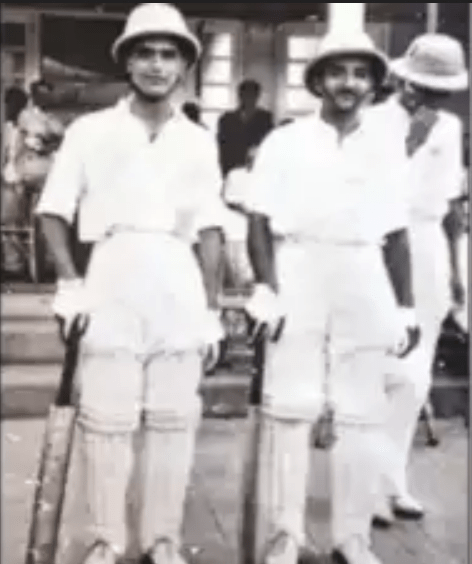It’s a rare ‘century’ that deserves a warm applause. On December 14, Russi Cooper, one of the oldest-living First-Class cricketers in India and certainly the oldest from Mumbai, will be celebrating his 100th birthday. After the passing away of Vasant Raiji in 2020, Cooper is now the only living Indian to have played in the Pentangulars, the pre-Independence league that hosted teams formed on community lines. He played for the Parsees (1941-42 to 1944-45), Bombay (1943-44 to 1944-45) and Middlesex (1949-1951).
Russi Cooper (left) and Vijay Merchant (right) scored hundreds in the Ranji trophy final between Bombay and Holkars played at the Brabourne stadium in 1944-’45.
In an interview with him at his daughter Dinaz’s residence in Pune last year, Cooper, when told that he was the only living cricketer who had played both in the Pentagulars and in the Ranji Trophy, replied: “Probably, yes.”
Cooper featured in 22 First-Class matches-with his crowning glory coming in the 1944-45 Ranji Trophy final, in which he scored a century for Bombay against Holkar. From 1940-55, he played with and against the best cricketers of that time.
The scorecard of the 1944-45 Ranji Trophy final between Bombay and Holkar at the Brabourne Stadium from March 4-8, 1945, makes for interesting reading. While Cooper scored 52 & then 104 in the second innings, Vijay Merchant, batting for more than eight hours, slammed 278 in the second dig, as Bombay scored 764 in 256 overs. After about 650 overs of play over five days, Bombay won a high-scoring game by 374 runs. “That was a match to finish,” he had told TOI.
That First-Class season (1944-45), in which he scored 551 runs at 91.83 with two tons and five fifties, turned out to be Cooper’s last in India. Speaking about his successful stint in First-Class cricket in India, during which he was forced to bat in the lower middle order, he had told TOI: “I was used to batting with Vijay Merchant and other top-order batsmen. There was no pressure on me to bat with the tail. I could bat freely. I was fortunate. Things could have been a bit different otherwise.”
At age 23, he went to the London School of Economics. In 1947, while studying at the LSE, he played for Middlesex County with the likes of Dennis Compton, JJ Warr and Bill Edrich. Though he didn’t taste much success with Middlesex, he scored plenty of runs in club cricket in the UK. An alumnus of Elphinston school and St Xavier’s high school, Cooper, on his first visit to The Oval and Lord’s in 1948, saw Don Bradman getting 146 and 98 in tour games against Surrey and MCC, respectively. “I was fortunate to get inside the stadium. We were in the queue from 5 am. And I have also got his signature. It is somewhere at my Bombay home,” he told TOI last year. He also saw greats like Ray Lindwall, Keith Miller, Duleepsinhji and Wally Hammond in action.
After completing his course in the LSE, he was invited by the Lincoln’s Bar for Bar At Law. He returned to India in 1954 but couldn’t play competitive cricket as his employers refused leave to play cricket. However, Cooper represented the Cricket Club of India in local tournaments and was a prolific scorer.
He was a trustee of the Bombay Port Trust for several years. Till his 90s, he was a practicing maritime lawyer. Currently, he lives at Grand Paradi in Kemp’s Corner in South Bombay. During Covid, he stayed in Pune with his only child – 66-year-old daughter Dinaz and son-in-law Hoshang Zaveri.
“Cricket and T20 is a big industry, fine. We used to get cleaning allowance for clothes and today’s cricketers are millionaires. That’s fine too. But there’s simply too much money rolling around,” he had told TOI. When asked if he considered Sachin Tendulkar as the greatest-ever Indian cricketer, Cooper suggested a couple of legends of his era were no less: “Duleepsinhji and Iftikhar Ali Khan Pataudi (Nawab of Patuadi) are up there.”
The Duleep Trophy is named after Duleepsinghji, and Pataudi made his Test debut for England during the Bodyline Series of 1932-33 Down Under, but was sent back after two Tests after disagreeing with captain Douglas Jardine’s ‘Bodyline’ tactics. In a conversation with TOI last year, Cooper remembered watching legendary England batsman Peter May bat at Lord’s with his mother Armaity. “Brian Johnston was on the air and he said, ‘May was dropped when he was five’. To that, my mother whispered: ‘Mothers are so careless these days!'” he recalled.

